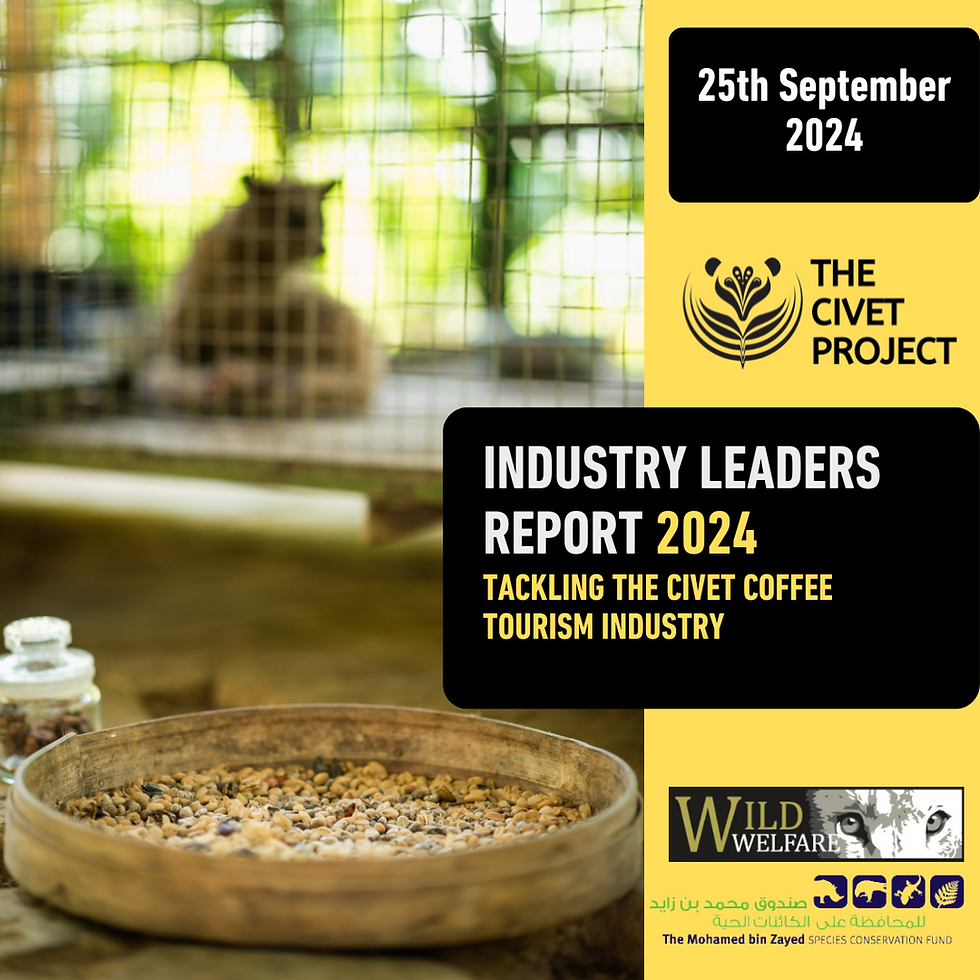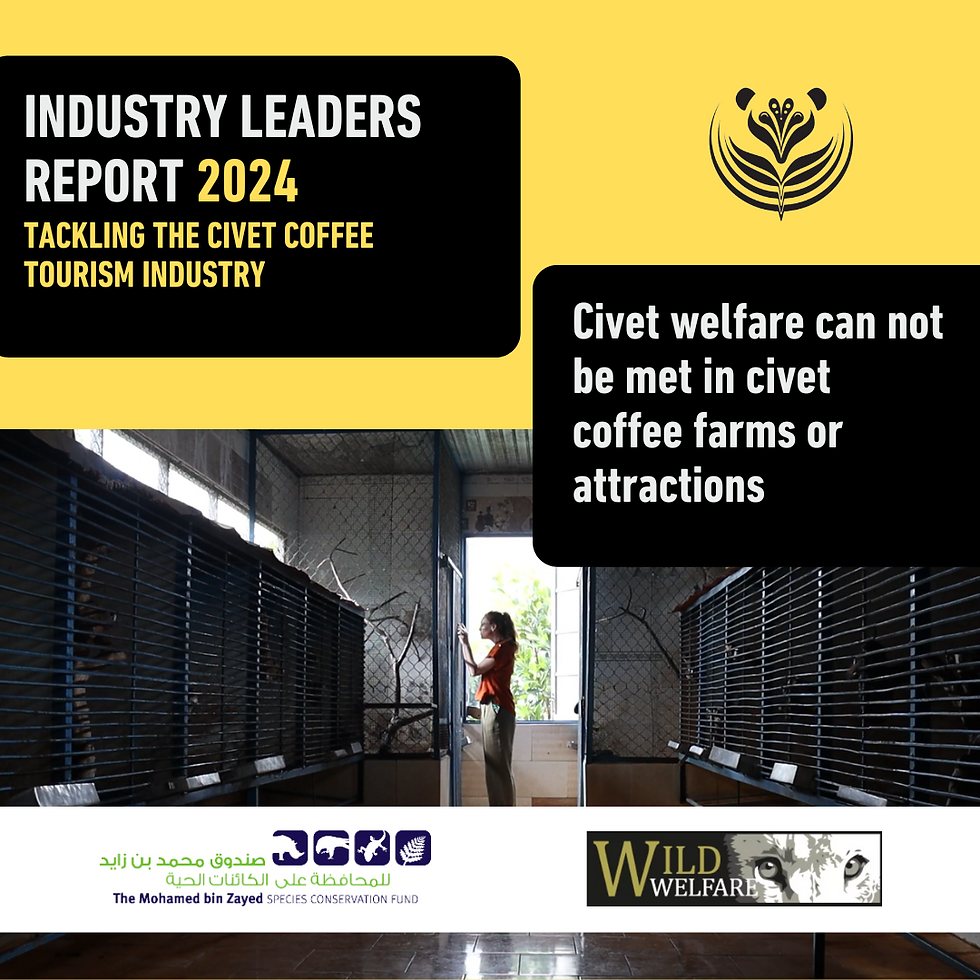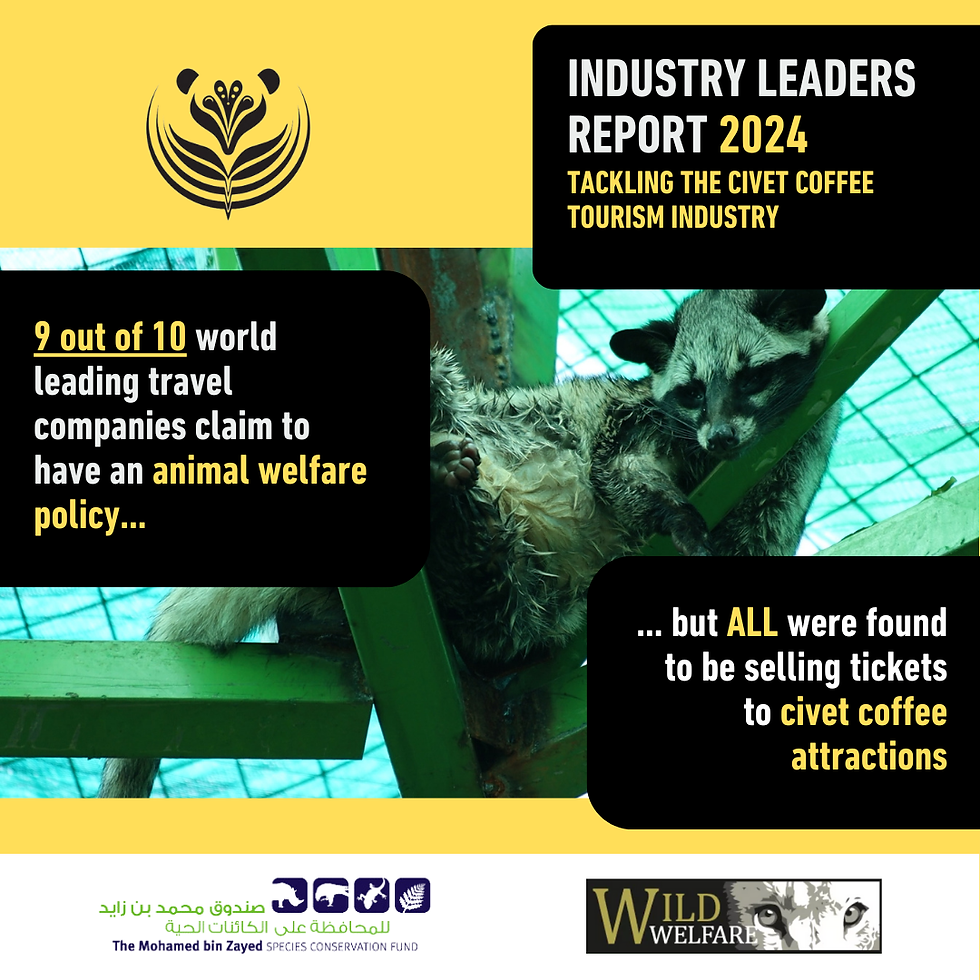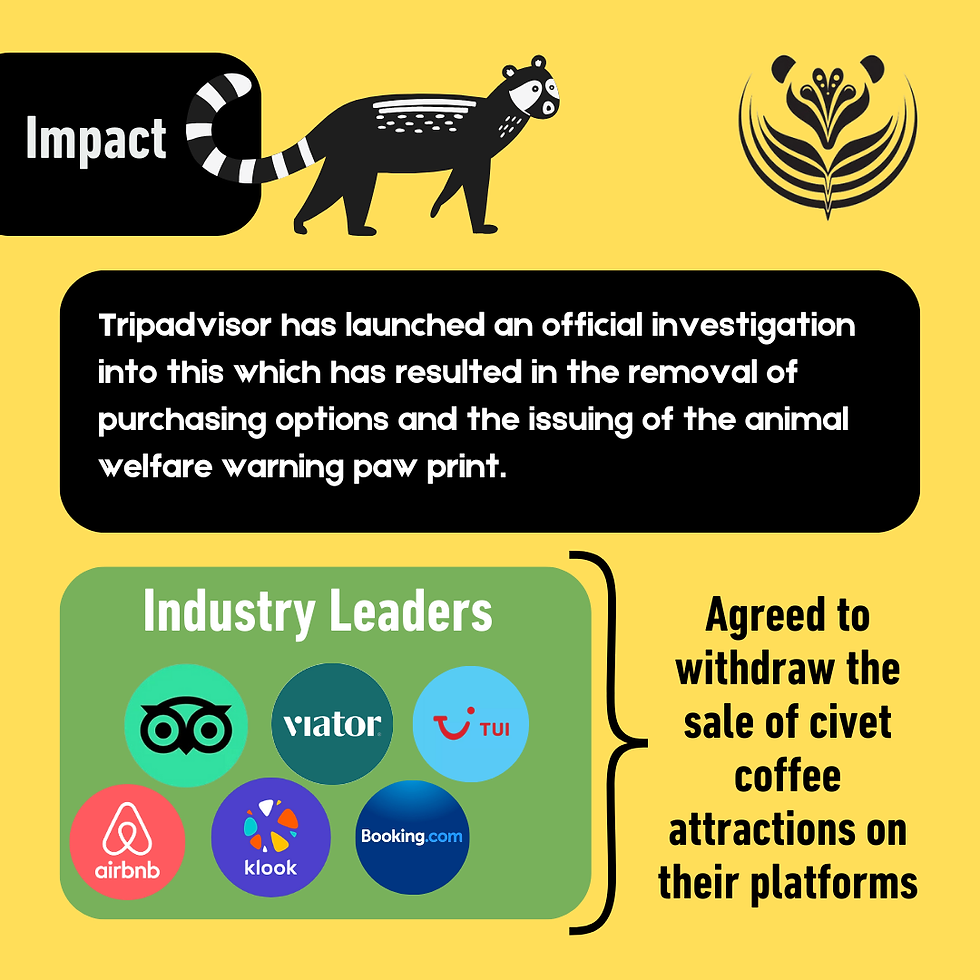Civet Coffee Attractions Dropped by Leading Travel Companies Following Our Report
- The Civet Project

- Sep 24, 2024
- 4 min read
The Civet Project Foundation team is proud to announce that world leading travel companies have stopped selling tickets to civet coffee attractions following our first-of-its-kind industry report.

The report ‘Industry Leaders: Tackling the Civet Coffee Tourism Industry’ investigates the secretive and dark world of civet coffee tourism and its hidden impacts on animal welfare, conservation and human health.
The report follows The Civet Project Foundation’s award winning documentary ‘Civet Coffee: From Rare to Reckless” which premiered on Ecoflix in April this year. In the film, researchers travelled to Vietnam in search of the true cost of civet coffee tourism on animal welfare, conservation and human health. Shocking undercover footage revealed a hidden link between wildlife trafficking, farming, and tourism, all of which included unhygienic conditions that could easily spread disease between wildlife and humans.
What is civet coffee?
Civet coffee (also known as kopi luwak) is a luxury coffee that has been pre-digested and defecated by civets, small nocturnal carnivores from Southeast Asia. Known as the most expensive coffee in the world, one cup of civet coffee can reach prices of up to £50. This high price point is set based on false marketing claims of product rarity. However, as this latest report shows:
civets are wild-caught for mass civet coffee production and are housed in hidden industrial farms throughout Southeast Asia.
What does this have to do with tourists?
Civet coffee plantation tours are a popular tourist experience throughout Southeast Asia. Tourists are taken to curated plantations where they have the opportunity to see the production process of civet coffee. Tourists may also be able to touch and take photos with the civets themselves, which typically live in small barren cages within the plantation.
What's so bad?
Civets suffer immensely in civet coffee facilities. To produce civet coffee, they are force-fed coffee cherries, typically leading to caffeine toxicity, malnutrition, and premature death. Civets are also kept in barren unsanitary cages with signs of disease, drugging and psychological distress. Diseased civets pose a threat to the tourists and workers who interact with them. Yet the disastrous effects of the industry don't stop there, the main source of civets for these facilities is wild capture though indiscriminate snaring. These snares damage other wildlife, as well as depleting the wild populations of civets to an unknown extent. The Binturong has already suffered population loss at the hands of wild capture for civet coffee facilities and is now listed as vulnerable.

The Report: What did they investigate?
The Civet Project investigated the extent of civet coffee tourism online, using Tripadvisor as a case study. Tripadvisor, the largest review site in the world, has committed to an animal welfare policy. According to Tripadvisor: “Tripadvisor will not sell tickets to, or generate booking revenue from, specific experiences where tourists come into physical contact with captive wild animals” However, the Civet Project’s investigation uncovered 369 civet coffee attractions on Tripadvisor, which took place across seven countries in Asia. Of these, 79% featured captive civets, only 6.8% were labelled with an animal welfare warning, and a shocking 90.8% were available to book online, all of which violate Tripadvisor’s animal welfare policy.
“Our findings show that civet coffee tourism is a key driver of the cruel and unnecessary civet coffee industry, and tourists are often unaware of the suffering involved,” said Dr. Jes Hooper, founder of the Civet Project Foundation.
“Tourists generally want to make ethical travel decisions, but they can only do that if trusted travel companies refuse to promote and sell tickets to attractions that harm animals, the environment and local people. It was alarming to find hundreds of civet coffee tour experiences for sale on leading travel provider websites, nearly all of which claimed to have animal welfare policies.”

Tripadvisor was not the only culprit, however. The Civet Project surveyed ten leading tourism operators, including TUI, Airbnb, Booking.com and Get Your Guide, and found that despite 9 out of 10 companies having an animal welfare policy, all were selling and advertising civet coffee attractions online.
What was the outcome?
The Civet Project’s progressive report has resulted in the removal of civet coffee booking options from the Tripadvisor website and the issuing of animal welfare warnings on civet coffee review listings. It is therefore no longer possible to book a civet coffee tour on the Tripadvisor platform. Several other travel providers are now also following suit. TUI, Klook, Airbnb and Booking.com have each committed to tackling civet coffee tourism on their platforms.

What comes next?
We are not stopping here. We are now calling on the UK government to officially include civet coffee tourism under the Low Welfare Activities Abroad Act (2023), which would legally prohibit the sale and advertisement of civet coffee tourism attractions to UK consumers. With 335,209 UK tourists visiting Indonesia alone in 2023, this could have a massive impact.
How You Can Help
Write to your local MP:
We encourage you to write to your local MP to ask them to support the inclusion of civet coffee attractions in to the Animals (Low Welfare Activities Abroad) Act 2023. Download our free template email and find your local MP.
Report civet-selfies on social media:
We advise you report civet coffee tourism posts on social media to halt its popularity online. The less civet coffee tourism is visible, the less there will be misinformation and product demand.
Inform your travel provider:
For those who have already experienced a civet coffee attraction, contact your travel provider about the civet suffering involved.





Great content on Marty Supreme jackets. The designs are modern and eye-catching.
Japanese makers focus on lifelike design to make high-quality adult companions. They use soft materials that feel natural and pay close attention to small details like skin texture, posture, and facial features. Many collectors note how the careful crafting and balance of weight add to a convincing presence. At shows, new styles are highlighted, such as in this link: https://betterlovedoll.com/blogs/all/what-interesting-dolls-were-showcased-at-the-2025-shenzhen-international-adult-expo. These dolls often reflect a blend of art and engineering, making them stand out from simpler figures. For many buyers, the look and feel make all the difference.
Trains, transfers, and check-ins are timed to reduce waiting and confusion, keeping days calm and purposeful. The Italy tours package appears midway through journeys, coordinating routes from historic centers to coastal towns without rush. Lodging choices sit near transport hubs, while guides manage entries and schedules. Meals, leisure pauses, and cultural stops are balanced to prevent fatigue. With clear pacing and thoughtful logistics, the journey feels connected, comfortable, and steady, letting moments shine without stress or wasted time.
The recent move by leading travel companies to drop civet coffee attractions highlights a growing global awareness about ethical tourism and animal welfare. Civet coffee, once seen as a luxury, has faced increasing criticism due to the inhumane conditions under which civets are kept and exploited for coffee production. This decision is a positive step toward promoting responsible travel and sustainable business practices that prioritize compassion over profit. As global entrepreneurship and travel evolve, it’s essential for businesses to align with ethical standards that reflect transparency and respect for all living beings. At ebizfiling, we believe ethical business practices are the foundation of lasting success, especially for entrepreneurs exploring Company Registration in India by foreigners. Upholding values of sustainability and…
FM WhatsApp is the perfect choice for anyone looking to enhance their messaging experience. With the latest FM WhatsApp APK, you can enjoy advanced privacy settings, unique themes, and exclusive customization options not found in the standard app. It’s built for users who want more control, style, and security in their chats. For a trusted and updated version, visit fmwatasa.com